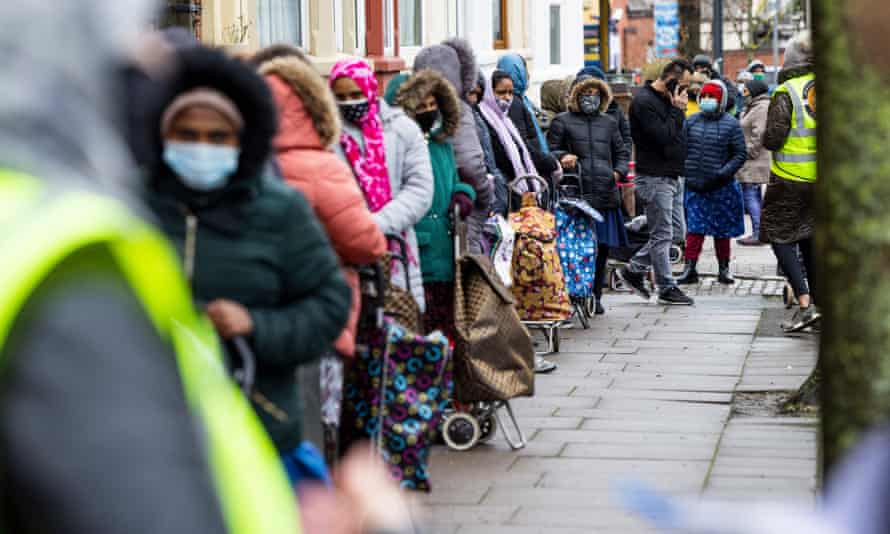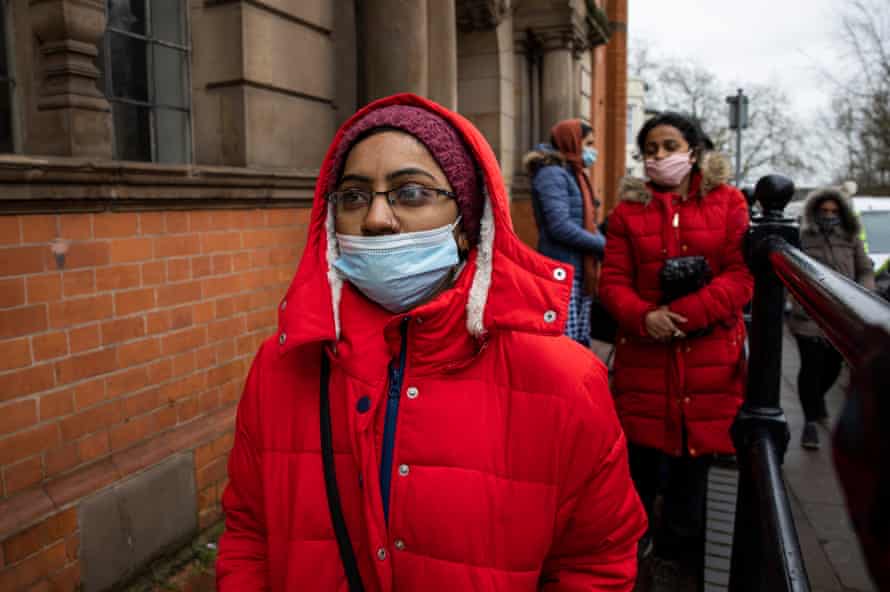The clock ticks past midday. At first it is just a trickle, mainly Gujarati Indian women in brightly coloured saris, some alone, others with young children. But within 30 minutes there is a queue of people wrapping itself around the Methodist church and down a sidestreet. This is a scene that has repeated itself three times a week, every week, since the beginning of the pandemic 12 months ago.
They are at Wesley Hall community centre in Leicester to collect food parcels. Today is a good day: even though the weather is blustery and rain streaks across the street, the queue is mercifully moving quickly. Volunteers check details and people fill their canvas shopping trolleys and return home to their waiting families. Other days aren’t so good: it is much busier and they wait for hours. Sometimes they are so cold they open their hot meal of rice, yellow split-pea dal and a chappati and eat while still standing outside the building.
For some of the mothers, eating immediately is just not an option. That hot meal has to make it back home. They will bulk it out with the tinned beans and potatoes from the food parcel, and that evening the family will have a “proper dinner”.
Many of these women and their families worked in Leicester’s garment factories. But as a result of a combination of factors including Covid, outbreaks at some of the sites and reduced profits, these factories have become empty hulls.

For some, life has changed inexplicably since the first lockdown a year ago. Leicester has the unfortunate distinction of being the British city that has endured Covid restrictions for the longest. In June it was the first area to be placed under local restrictions, and families from different households have not been allowed to meet indoors for a year.
Some say the unrelenting nature of the restrictions and its detrimental effect on the city’s economy, with many being pushed into a life of poverty, will become a lasting legacy of the pandemic.
Outside the food bank in Spinney Hill, Aarti, 59, is here for the second time this week. She and her husband lost their jobs as machinists when the garment factory they worked at closed permanently last winter. They have two daughters and Aarti says the family would go hungry were it not for the food bank.
“We do not have a choice,” she says, speaking via an interpreter. “We have moved down the ladder and we eat only because we come here. They give us fruit and vegetables and other things which I use to make haandi [curry]… We don’t know if we will get our jobs back and when this will end.”
Further down the line, wrapped up in a big red puffa jacket, is 26-year-old Poonam. Like Aarti she is of Indian Gujarati heritage. She moved to the UK in 2013 and had worked in Leicester’s garment factories ever since. She is also a regular at the food bank but today she has two parcels to collect – one for her sister who has just given birth to a baby girl.

“We live together because it is cheaper and we now both don’t have work any more – the factory said they could not give us any hours,” she says. “It would be the worst thing if this was not here because we can’t pay for the [food in the] shops. Many are in the same position.”
This same story, to a lesser or greater extent, repeats itself down the queue. Those who have lost their jobs, others who are on such low wages they cannot get by. All living in multi-generational households with many younger and elderly relatives to feed and support.
Volunteers at the centre say they could work 24 hours a day handing out the parcels and it would only touch the surface. Just under a mile away from the community centre, volunteers visit Harjeet, who has a young child. In some exceptional circumstances parcels are taken to the homes of what the volunteers call “service users”.
Eighteen-month-old Arjun clings to his mother. Every now and then he steals a glimpse at the strangers in his home. It has been a long time since anyone has visited. Harjeet and her husband are asylum seekers. Neither is able to work legally as they do not having a work permit.
Harjeet, 32, a Punjabi business management student, says the consequences of living under restrictions has affected the whole family’s mental health. This combined with having to rely on handouts from the food bank has eroded her confidence. They depend on the food bank for essentials including nappies for Arjun and bread and milk.
“Sometimes I look in the mirror and I am stuck in this situation … I think ‘why is my life like this’?” says Harjeet in a soft, almost indiscernible voice. “I am always in the house, not feeling comfortable. There is nowhere to go and we can’t see people. I hope though one day we can work in a factory job and my life will change.”
Leicester has one of the highest Covid infection rates in the UK. The latest statistics show 114.3 infections for every 100,000 people in the seven days to 13 March, almost twice the national average.
Prof Kamlesh Khunti, a Leicester GP, grew up in Spinney Hill. Of Indian and Ugandan heritage, his family of 10, some of whom were displaced under the Idi Amin regime in Uganda, lived in a two-bedroomed house. Khunti understands the pressures of multigenerational households and describes Leicester as a very complicated microcosm.
“There are very complex dynamics in Leicester,” he says. “So we’ve got certain Asian areas with poverty and high density per house, and if you’ve got a key worker they will catch it and then the disease can pass quickly through generations.”
Then there’s the issue of factory work, where many of Leicester’s Asian population are employed. With little regulation, many of the factory workers are kept on zero-hours contracts. Resham Singh Sandhu, the former high sheriff of the city and a community faith leader, says even if they become infected with Covid-19, they cannot afford to self-isolate.
“They will not declare that they are positive with the virus and will carry on working in the factories because they need the money. But eventually the family suffers because they all become ill,” says Sandhu, who is part of the city’s Covid-19 taskforce.
Sandhu is also concerned about vaccine uptake and believes that this, in tandem with high infection rates, could mean Leicester’s suffering is prolonged. “I think it’s going to be very long-term and the community is going to suffer a little bit longer than the rest of the country,” he says. “We have distributed leaflets in different languages about the vaccine and tried to answer questions, but still some fears remain and this worries me. It is not sinking in.”
Khunti, a member of the government’s Sage advisory committee, says the issue is not confined to Asian communities. There are parts in the north-west of the city with predominantly white populations where the disease is also thriving. But whatever the reason for the stubbornly high Covid rates, Khunti says one thing is very clear: the effect of the restrictions on his city has been distressing.
“You know, we’re a proud city,” he says. “Not so long ago we were known across the world because we had won the [Premier League], it put Leicester on the world map. But this pandemic has just devastated our proud city.”
This content first appear on the guardian
